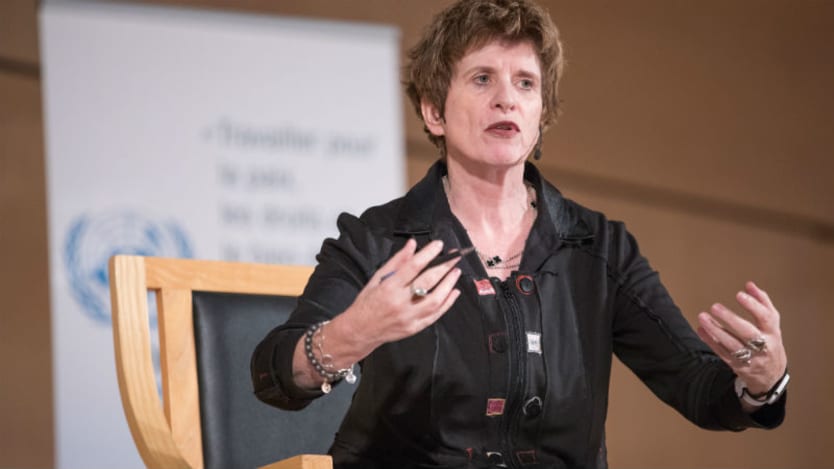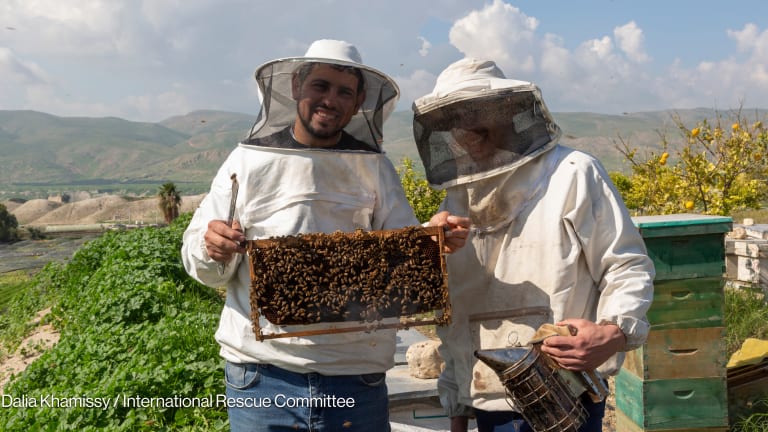
LOS ANGELES — Cities play a fundamental role in promoting human rights. That’s the message Kate Gilmore, United Nations deputy high commissioner for human rights, urged people to consider at a celebration of the 70th anniversary of the U.N. Declaration of Human Rights, in Los Angeles.
“We're here to discuss and consider how best for L.A. to emerge as a model for bringing rights home,” she said Monday, before addressing an audience at the University of Southern California at an event called “Global to Local: Cities for Human Rights & Sustainable Development.”
“The way in which we can practically tackle inequality is a different project in the city than from a national standpoint.”
— Kate Gilmore, U.N. deputy high commissioner for human rights“The SDGs are an operating plan for the Human Rights Declaration,” she continued, building the connection between human rights and the Sustainable Development Goals. “If we don't integrate a solid loyalty to the principles of human rights in that plan, it will fundamentally fail to do anything about people left behind.”
Gilmore spoke with Devex about ways that cities can advance human rights and how the global development community needs to adapt in order to reflect not only the shift of people from rural to urban settings, but also the world’s growing youth population. The conversation has been edited for length and clarity.
What is driving this recognition of the role that cities can play in human rights and sustainable development?
“The development agenda has always been much more rooted in a rural sensibility … Today, it's a very different story.”
—For the first time in human history, there are more people living in the city than in non-urban settings. That suggests to us yet-untapped potential for the city to bring rights home.
How do we move in public space safely, securely, confidently? How do we dismantle the inequalities of race-based and gender-based discrimination? How do we ensure that women and men feel safe in the streets? These are questions that cities, and the leadership of cities, can make even more immediate impacts on than perhaps national governments.
It's only been a few years since demographically, in terms of global population distribution, the city has emerged as home to most people for most of the time. The development agenda has always been much more rooted in a rural sensibility, in a sense of people being deprived of infrastructure, at a distance from resources, and in need of a hand up to be connected to those resources or to bring the resources closer to them. Today, it's a very different story.
People are more concentrated. Urban spaces are spreading. Many cities are much larger than single countries. And the capacity to do great harm and to do great good is largely rooted in those population-dense areas.
It’s part of a response, too, to a sense of emerging resistance from national governments to being held accountable to international standards.
How is the U.N. responding to these changing dynamics?
“What's the bend we need to make to become more relevant, more competent, for the world as it is and is becoming, not the world as it was?”
—We've had the idea of person-centered urban development for some time. What I think is changing is the scale and urgency. Again, because of the demographic realities, but also the challenges facing cities, and just the way in which we can practically tackle inequality is a different project in the city than from a national standpoint.
I think it's about putting the city into stronger focus. The U.N. is leaning into a change that is there by data — that is asking of us new practices, new relationships, new partnerships.
Naturally enough, that takes a little while to build that confidence and trust, but we've been very struck by the appetite of the city to get it together.
Part of the thing is getting the city more to the table of discussion and examination, and not to be held so much under the shirt tails of national governments, to assure cities that via these multisectoral forums, they are as entitled to speak as everybody else.
“Coincident with this shift out of rural to urban settings is another major demographic change unprecedented in human history: it's the large number of young people alive in the world today.”
—While your focus today is on the role of cities, what are other messages you have about trends that require a response from the global development community?
Coincident with this shift out of rural to urban settings is another major demographic change unprecedented in human history: it's the large number of young people alive in the world today.
I believe that given the nature of the challenges we're up against that demand a break with all thinking and the start of new thinking, that we have to reframe young people as a competency rather than as a problem. Human history absolutely is persuasive in that it's people under 30 who make the most extraordinary breakthroughs. Today, with climate, conflict, contagion, the digital age — we need young thinkers at the table and we've got to find a succession plan of bringing those leaders to the table much sooner.
I would ask every organization, every entity, to publish an annual report on the demography of power. Correlate influence over decision-making to gender, age ethnicity, and see what it would tell us.
I happen to know the median age in Uganda is 15. The median age of parliamentarians are 53. Think about what that tells us about the demography of power.
Think about how age plays into conflicts today in the Central African Republic, the Democratic Republic of Congo, South Sudan, Yemen.
We should be held accountable to the current demography of power in our organization.
What's the bend we need to make to become more relevant, more competent, for the world as it is and is becoming, not the world as it was? Our organizations are all peopled on the basis of how it was, not peopled on the basis of how it needs to become — and that needs to change.








